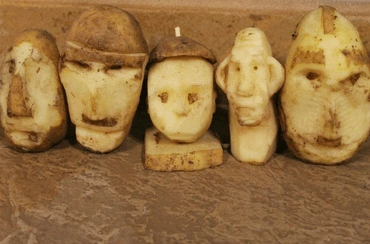1
Utvara Avdijeva. Ovako veli Gospod Gospod za edomsku: Čusmo glas od Gospoda, i glasnik bi poslan k narodima: Ustajte, da ustanemo na nju u boj.
2
Gle, učiniću te malim među narodima, bićeš vrlo prezren.
3
Ponos srca tvog prevari te, tebe, koji živiš u raselinama kamenim, u visokom stanu svom, i govoriš u srcu svom: Ko će me oboriti na zemlju?
4
Da podigneš visoko kao orao i među zvezde da metneš gnezdo svoje, odande ću te oboriti, govori Gospod.
5
Kako si oplenjen?! Da su došli k tebi kradljivci ili lupeži noću, ne bi li pokrali koliko im je dosta? Da su došli k tebi berači vinogradski, ne bi li ostavili pabiraka?
6
Kako se pretraži Isav, kako se nađoše potaje njegove!
7
Do granice te odvedoše svi koji behu s tobom u veri, prevariše te i nadvladaše te koji behu u miru s tobom; koji jedu hleb tvoj podmetnuše ti zamku, da se ne opazi.
8
U onaj dan, govori Gospod, neću li pogubiti mudre u zemlji edomskoj i razumne u gori Isavovoj?
9
I tvoji će se junaci uplašiti, Temane, da se istrebe pokoljem svi iz gore Isavove.
10
Za nasilje učinjeno bratu tvom Jakovu pokriće te stid i istrebićeš se zasvagda.
11
Onaj dan, kad ti stajaše nasuprot; onaj dan, kad inostranci odvođahu u ropstvo vojsku njegovu, i tuđinci ulažahu na vrata njegova i bacahu žreb za Jerusalim, beše i ti kao koji od njih.
12
Ali ti ne trebaše gledati dana brata svog, dana, kad se odvođaše u tuđu zemlju, niti se radovati sinovima Judinim u dan kad propadahu, niti razvaljivati usta u dan nevolje njihove.
13
Ne trebaše ti ući na vrata naroda mog u dan pogibli njihove, ne trebaše da i ti gledaš zlo njihovo u dan pogibli njihove, ni da se dohvataš dobra njihova u dan pogibli njihove.
14
Niti trebaše da staneš na rasputicu da ubijaš bežan njihovu, niti da izdaješ onih koji ostaše u dan nevolje.
15
Jer je dan Gospodnji blizu svim narodima: kako si činio, tako će ti biti, plata će ti se vratiti na glavu tvoju.
16
Jer kao što ste vi pili na svetoj gori mojoj, tako će piti svi narodi vazda, piće, i ždreće, i biće kao da ih nije bilo.
17
A na gori će Sionu biti spasenje, i biće sveta, i dom će Jakovljev naslediti nasledstvo svoje.
18
I dom će Jakovljev biti oganj i dom Josifov plamen, a dom Isavov strnjika; i razgoreće se na njih, i spaliće ih; i neće biti ostataka domu Isavovom, jer Gospod reče.
19
I naslediće jug, goru Isavovu, i ravnicu, Filisteje; i naslediće polje Jefremovo i polje samarijsko i Venijaminovo i Galad;
20
I zarobljena vojska sinova Izrailjevih naslediće šta je bilo hananejsko do Sarepte; a roblje jerusalimsko, što je u Sefaradu, naslediće južne gradove.
21
I izbavitelji će izaći na goru Sion da sude gori Isavovoj, i carstvo će biti Gospodnje.







